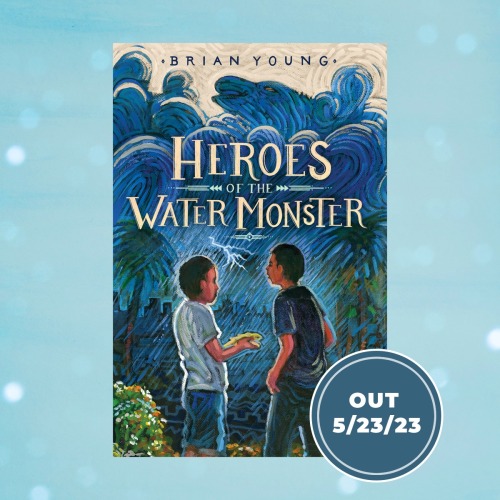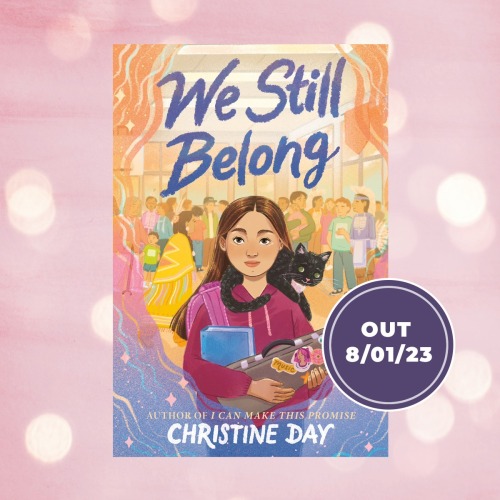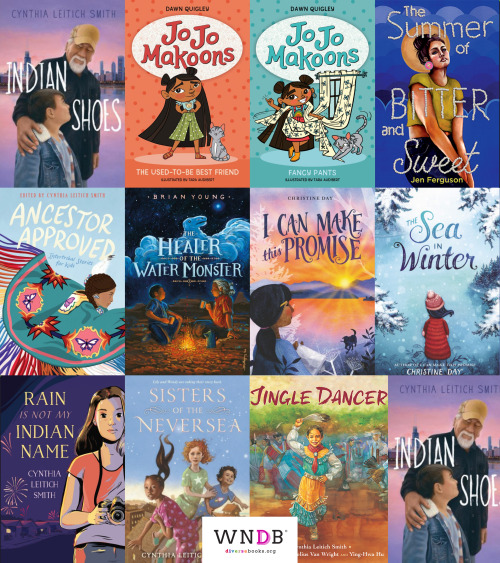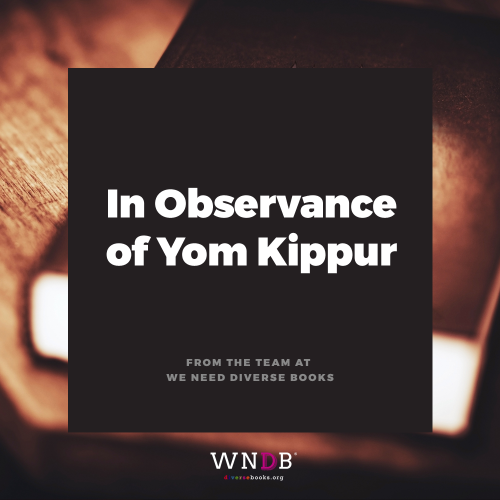BOOKS SAVE LIVES!!!
WE NEED DIVERSE BOOKS
When all your life you hear people tell you to go back to your own country, you start to believe you don’t belong in the only place you’ve ever called home. Thank you Amy Tan for JOY LUCK CLUB & healing me & saving me from my own self loathing. Little me would have loved to have had the books that are now being attacked. We must fight back against book bans and remind everyone that Books Save Lives!!!
A non-profit and a
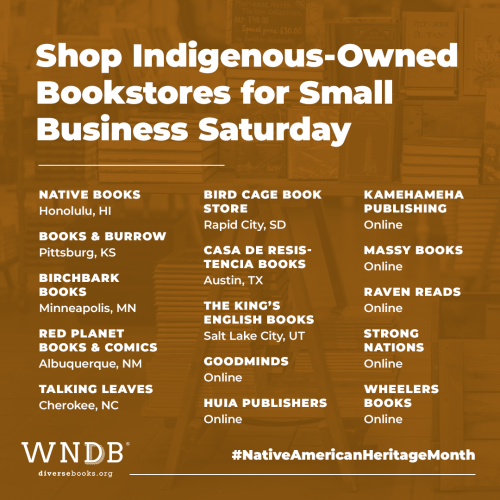
It’s Small Business Saturday! As Native American Heritage Month winds down, here are Indigenous-owned bookstores (including Native Hawaiian- and Pacific Islander-owned stores) you can shop.
Store links:
- Libélula Books & Co (San Diego, CA)
- Quiet Quail Books (Southern California)
- Native Books (Honolulu, HI)
- Books & Burrow (Pittsburg, KS)
- Birchbark Books (Minneapolis, MN)
- Red Planet Books and Comics (Albuquerque, NM)
- Black Walnut Books (Glen Falls, NY)
- Talking Leaves (Cherokee, NC)
- Bird Cage Book Store (Rapid City, SD)
- Red Salmon Arts, Casa de Resistencia Books (Austin, TX)
- The King’s English Bookshop (Salt Lake City, UT)
- Iron Dog Books (Vancouver, BC, Canada)
- Massy Books (Vancouver, BC, Canada)
- Goodminds (Online)
- Huia Publishers (Online)
- Inhabit Books (Online)
- Kamehameha Publishing (Online)
- Paperbacks & Frybread (Online)
- Raven Reads (Online)
- Strong Nations (Online)
- Wheelers Books (Online)
**Edited with a few additions/updates! If you know of any other stores that belong on this list, feel free to drop it in the replies.
[Image description: WNDB graphic featuring text that reads, “Shop Indigenous-Owned Bookstores for Small Business Saturday: Native Books (Honolulu, HI), Books & Burrow (Pittsburg, KS), Birchbark Books (Minneapolis, MN), Red Planet Books and Comics (Albuquerque, NM), Talking Leaves (Cherokee, NC), Bird Cage Book Store (Rapid City, SD), Casa de Resistencia Books (Austin, TX), The King’s English Bookshop (Salt Lake City, UT). ONLINE-ONLY stores: Goodminds, Huia Publishers, Kamehameha Publishing, Massy Books, Raven Reads, Strong Nations, Wheelers Books]
(Source: diversebooks.org)
Happy Native American Heritage Day! Heartdrum is a Native-focused imprint curated by Cynthia Leitich Smith that offers a wide range of stories by Native creators,
informed and inspired by lived experience, with an emphasis on the
present and future of Indian Country and on the strength of young Native
heroes.
Read more about each book and download the educator guide here.
* * *
Heartdrum books available for preorder:
- Just Like Grandma by Kim Rogers, illustrated by Julie Flett (out 1/24/23)
- Heroes of the Water Monster by Brian Young (out 5/23/23)
- We Still Belong by Christine Day (out 8/1/23)
Heartdrum books currently out:
- Indian Shoes by Cynthia Leitich Smith
- JoJo Makoons and the Used-to-Be Best Friend by Dawn Quigley, illustrated by Tara Audibert
- JoJo Makoons: Fancy Pants by Dawn Quigley, illustrated by Tara Audibert
- The Summer of Bitter and Sweet by Jen Ferguson
- Ancestor Approved edited by Cynthia Leitich Smith
- The Healer of the Water Monster by Brian Young
- I Can Make This Promise by Christine Day
- The Sea in Winter by Christine Day
- Rain is Not My Indian Name by Cynthia Leitich Smith
- Sisters of the Neversea by Cynthia Leitich Smith
- Jingle Dancer by Cynthia Leitich Smith
* * *
[Image description: The top image is a graphic with a light green background and text that reads, “Heartdrum Books to Read or Preorder on Native American Heritage Day”. The next image is a graphic with a light orange background that features the cover art for JUST LIKE GRANDMA. The next image is a graphic with a light blue background that features the cover art for HEROES OF THE WATER MONSTER. The next image is a graphic with a light pink background that features the cover art for WE STILL BELONG. The last image is a graphic featuring the tiled cover images for the rest of the books listed in the post above.]
The Dangers of Current Book Bans and Censorship in the US
This movement to ban and soft censor (quietly pull or not purchase) books is extremely dangerous. They are deliberately targeting diverse books, in particular - LGBTQ+ and BIPOC, because this is a movement to silence historically marginalized voices.
The people leading the book banning effort don’t want these books in schools, libraries, even bookstores! They are not content to police their own children, but have taken grave overreaching steps to police what ALL youth have access to. But the worst part is the deceptive campaign of lies and misinformation that is used to control a very specific narrative. Books are accused of being porn, grooming, race baiting, fearmongering. But that’s not what it is really about. At the heart of this book banning movement is a desire to take away our youth’s ability to read and empathize with people who are not white, not cis, not straight, not able bodied. It is the most egregious form of othering. It is hammering home to those who do not fall within those labels that they are not part of the American story. Because when they ban LGBTQ+ and BIPOC books as they scream “think of our children!” what they are really saying is they are only interested in protecting a very specific type of child.
These book bans are driven by the larger movement to restrict classroom conversations and lessons about race and LGBTQ+ issues that has been led by certain groups driven by fear and hate in response to the progress made by marginalized voices. It’s not new. There have always been people in power who are afraid of what “losing their power” would look like. They thrive on fear mongering. Fear of the poor, of immigrants, of Black and Indigenous people of color, of those with mental and physical disabilities, of LGBTQ+ people, of all who are not like them. And these days anyone speaking up become the targets of harassment, hate and threats, especially teachers and librarians.
But know that they are targeting schools, and children, because controlling education and our youth is a long game strategy for them. If the impact of racism and bigotry are not taught in the classroom, if books about marginalized kids are censored and unavailable, we risk creating a generation of kids who never learn the value of empathy. And when marginalized kids don’t see themselves in the literature they read, we teach them that they are not valued, not wanted. That they are not equal. And there is no greater devastation to a child than to feel like there is no place for them in the world.
Right now we all need to be aware of what is happening and do whatever we can to speak up, make noise, fight back! There are so many ways you can help. Read articles. Pen America and Book Riot has been following the bans across the country. Take a look at all the books being banned. Support the authors and the books however you can. Go to the library and borrow them. If they are not there, ask them why. Attend local government meetings and make yourself heard! Form banned book clubs. Write to your local school boards, assemblymen, congressmen, let everyone know that banning and censoring these books is wrong! There are both small and big things that everyone can do!
Remember, there is a young person out there who needs one of these books so that they can feel seen and loved and know that they are not alone. That book might just save their life.
"- Tenoch Huerta, Namor in Black Panther: Wakanda Forever, explains why the movie got it rightIn Latin America, especially Mexico, we have a lack of representation. [TV in Mexico] looks like a Scandinavian country, all the people are white…
When they decide to give this background to Namor, you know, this new background — Mesoamerican culture, especially Mayan culture — I think they nailed it. Because it’s the right moment to do it in a way, on one hand, and on the other hand, it’s important for many people, especially kids. It’s a way to say, ‘Eh, there’s nothing wrong on you. You should be proud of who you are. And the melanin in your skin … it’s OK and it’s beautiful.’
"
How to talk about disability sensitively and avoid ableist tropes
When it comes to disability, a lot of ableist language and tropes are perpetuated by the media. Here's what experts have to say about how to talk about disability.
“Aside from language preferences, disability identity is a journey that is very individualized. It’s important to show the disabled experience from all sides.For instance, many individuals within the disability community emphasize the harm in writing stories about disabled people that frame them as being pitiable, unhappy or bitter all the time due to their disability. The same is true, however, for stories that center disabled people as being saint-like and positive all the time.“

Congratulations to the 2022 Walter Grant winners! Since 2015, we’ve awarded grants of $2000 each to unpublished writers or illustrators from marginalized
backgrounds who are working on children’s or young adult literature
projects. Past winners include Jennifer de Leon (Don’t Ask Me Where I’m From), Jacqueline Alcantara (The Field), and Angie Thomas (The Hate U Give).
This year we’re excited to announce the recipients of 11 grants, including two for trans creators (thanks to @what-eats-owls), two for Muslim creators (thanks to Hanna Alkaf), and two for Native/Indigenous creators (supported by the WNDB Native fund).
✨ GENERAL WALTER GRANT ✨
Jasmine Cui
Anna Marie “Amie” Rodriguez
Nia DeCoux Milner
Talia Kimberly Wright
Revy Sivilay / @rhiotta
✨ TRANS CREATOR GRANT ✨
Logan Hoffman-Smith
Sunday Avanti
✨ NATIVE/INDIGENOUS CREATOR GRANT ✨
Christine Hartman Derr
Kara Stewart
✨ MUSLIM CREATOR GRANT ✨
Sarosh Arif
Hafsa Zulfiqar Unar
* * *
The 2023 Walter Grant cycle will open to applications next year in the spring.
[Image description: WNDB graphic featuring a stock image of out-of-focus gold glitter thrown in the air and text that mirrors the list of winners included in the post. The grant categories are nested within illustrated banners.]
(Source: diversebooks.org)
Banned Books Week is ending, but challenges to books—especially those by/featuring people from marginalized groups—will continue. We’ve compiled resources to help everyone keep advocating for diverse books:
GENERAL BANNED BOOK RESOURCES
- Banned Books Week Official Resources – “The
members of the Banned Books Week coalition have a number of resources
available to support Banned Books Week programming, promotion of the
annual celebration of the right to read, and banned books themselves.
Many of these resources can be used throughout the year, so you can
celebrate the right to read every day!”
- American Library Association (ALA) Frequently Challenged Books – “We
compile lists of challenged books in order to inform the public about
censorship efforts that affect libraries and schools. Peruse the
following pages to explore banned and challenged books by topic, genre,
time, and audience.”
- ALA Banned Books Week Q&A – “This
resource offers issues, strategies, and resources for preparing your
professional community (teacher librarians and public librarians) to
celebrate Banned Books Week.”
- National Coalition Against Censorship (NCAC) Resources – “Learn
about your First Amendment rights, what censorship can look like,
techniques for preventing it, how to handle incidents of silencing and
specific ways to defend free expression in your communities and
nationally.”
FURTHER READING
- How to Talk With Students About Banned Books – “[An]
important aspect to consider is who is bringing forth the complaint to
remove the books. Is there a concerned parent that found graphic
violence in a children’s book? Or is there a publishing group that
recognizes the harm of continuing to promote outdated tropes? Or is
there a group with a political agenda to censor?”
- Why Your Kid Should Read Banned Books – “Five good reasons for kids to read banned books.”
- 5 Things You Can Do to Support the Right to Read – “Whether
you’re a librarian, teacher, bookseller, student, or writer, there are a
number of things you can do to defend and support the right to read.”
- Are Antiracism Books for Kids Actually Working? –
“Books cannot fully inform children on how to combat racism unless they
also read books that relay stories and messages from people of color.”
- Windows, Mirrors, and Sliding Glass Doors – Dr. Rudine Sims Bishop’s seminal essay on how reading seeds empathy, especially in children. “Children from dominant social groups have always found their mirrors in books, but they, too, have suffered from the lack of availability of books about others.”
FOR DIRECT CHALLENGES
- ALA Challenge Support – Resources
for librarians seeking support (whether in the form of guidance or
encouragement) during censorship challenges, including information on
when and how to directly contact the Office for Intellectual Freedom, which “is charged with implementing ALA policies concerning the concept of intellectual freedom as embodied in the Library Bill of Rights, the Association’s basic policy on free access to libraries and library materials.”
- National Council of Teachers of English (NCTE) Intellectual Freedom Center – Includes
a handbook for educators on responding to book challenges and contact
information for NCTE members seeking support/assistance with censorship
issues.
- NCAC Book Censorship Action Kit – The
NCAC’s “collection of materials on how to effectively fight challenges
to books in schools for the use of students, educators, parents, and
authors.” Includes advocacy tips, concrete actions, form letters, and
more.
- Comic Book Legal Defense Fund – “Comic
Book Legal Defense Fund is a non-profit organization dedicated to the
protection of the First Amendment rights of the comics art form and its
community of retailers, creators, publishers, librarians, and readers.
The CBLDF provides legal referrals, representation, advice, assistance,
and education in furtherance of these goals.”
- NCAC/CBLDF’S Be Heard! Protecting Your Protest Rights – For students specifically, including guidelines on how to work with school limitations on free speech.
*****
[Video description: Over a series of still images of books and stock footage of reading and learning, the following text displays across the screen:
“Banned Books Week is September 26 – October 2. This annual event celebrates the freedom to read and ‘highlights the value of free and open access to information.’ The first Banned Books Week was in 1982, following a sharp increase in challenges to books in libraries, bookstores, and schools. While most challenges are unsuccessful, if a book is banned, it is removed. According to the American Library Association, parents challenge materials more often than any other group.
The top 10 most challenged books for 2020 include themes of racial justice, stories centered around BIPOC, and LGBTQIA+ content. Of the top 10 most challenged books, 70% were by authors from marginalized groups.
Banned Books Week ‘brings together the entire book community in shared support of the freedom to seek and to express ideas, even those some consider unorthodox or unpopular.’ 2021’s theme is ‘Books Unite Us. Censorship Divides Us.’
‘Ever since the existence of books, there have been those that have wanted to control them. Books are messengers. They can educate and liberate, as well as entertain and invite readers into worlds they never knew existed. Books give people hope.’ — Nicole Klett, ‘How to Talk With Students about Banned Books'”
The video ends with credits acknowledging sources of information: www.ala.org and www.bannedbooksweek.org.]

Looking for children’s and young adult books by Palestinian authors? Hannah Moushabeck’s list is an excellent place to start:
Children’s Books:
- Sitti’s Secrets by Naomi Shihab Nye, illustrated by Nancy Carpenter
- The Ghoul by Taghreed Najjar, illustrated by Hassan Manasra
- Young Palestinians Speak: Living Under Occupation by Anthony Robinson & Annemarie Young
- Halal Hot Dogs by Susannah Aziz, illustrated by Parwinder Singh
- Farah Rocks by Susan Muaddi Darraj
- Baba, What Does My Name Mean? by Rifk Ebeid, Illustrated by Lamaa Jawhari
Young Adult:
- Don’t Read the Comments by Eric Smith
Tasting The Sky: A Palestinian Childhood by Ibtisam Barakat
Wondrous Journeys in Strange Lands by Sonia Nimr
Graphic Novels for Older Readers:
- Baddawi by Leila Abelrazaq
Mis(h)adra by Iasmin Omar Ata
The Hookah Girl: And Other True Stories by Marguerite Dabaie
Read more about each book (including why Moushabeck recommends them) here!
[Image Description: Graphic featuring the
WNDB logo and a tiled square of cover art for 12 children’s and young
adult books written by Palestinian authors, set against a colorful
background of abstract shapes.]
"- Author Saadia Faruqi wrote about how to talk to young people about 9/11—especially the impact that it had on MuslimsThe first thing to understand is that 9/11 is more than a historical event, more than something to learn in a history class or module. As an adult, if we don’t realize the significance of these attacks on the last 20 years, we won’t really be able to discuss the topic with the young people in our lives. 9/11 changed everything for everybody, but most of all for the Muslim community in the US and around the world.
Things you may be aware of include airport security and the wars on terror. Things you may not be aware of include everyday discrimination of anyone who looks like the enemy, whether by random screening at the airport, while walking the streets in hijab, or seeking a job. The effect of 9/11 on everyday living has been highlighted by many organizations… Adults in schools often bully Muslim children they’re responsible for[.] Muslims are deemed unwelcome in their communities, as evidenced by anti-mosque activity documented by the ACLU. In this environment, it’s imperative that we unpack all that the last 20 years have wrought, learn from it, and discuss it.
"
(Source: diversebooks.org)

Looking for children’s and young adult books by Jewish authors? Katherine Locke’s list is an excellent place to start:
Picture Books:
- Gitty and Kvetch by Caroline Kusin Pritchard, illustrated by Ariel Landy
- The Polio Pioneer: Dr. Jonas Salk and the Polio Vaccine by Linda Elovitz Marshall, illustrated by Lisa Anchin
- Tía Fortuna’s New Home by Ruth Behar, illustrated by Devon Holzwarth
Middle Grade:
- The Magical Imperfect by Chris Baron
The Many Mysteries of the Finkel Family by Sarah Kapit
Recipe for Disaster by Aimee Lucido
Young Adult:
- Strange Creatures by Phoebe North
Cool for the Summer by Dahlia Adler
The City Beautiful by Aden Polydoros
Read more about the books (including why Locke recommends them) here!
[Image Description: Graphic featuring the
WNDB logo and a tiled square of cover art for 9 children’s and young
adult books written by Jewish authors, set against a colorful
background of abstract shapes.]

Shanah Tovah to all of our followers celebrating Rosh Hashanah! We wish you and your loved ones good health and a sweet new year. ❤️🍯🍎💛
[Image description: Graphic featuring the
WNDB logo, a stock background image of a jar of honey lying in a
cluster of apples, and text that reads, “Shanah Tovah from the team at
We Need Diverse Books”]
"I felt and feel a bit weird that grief has shaped so much of my work, even though it actually makes sense. In a global community where Black women especially are lauded for resilience, making room for grief was also me making room for rest, for imagining a space to express my grief openly, which is so rarely afforded to many folks, including children. It even made space for humor."-
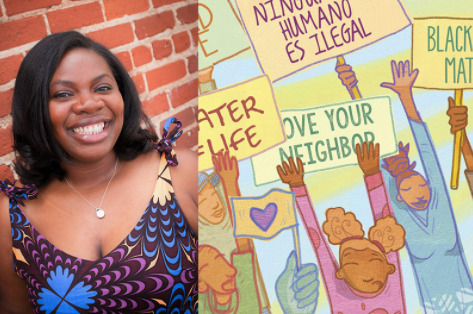
[Image description: To the right, a headshot of author Breanna McDaniel, a Black woman. To the left, artwork of people holding up signs with phrases like “Black Lives Matter” and “Love Your Neighbor,” excerpted from Breanna’s picture book HANDS UP!, illustrated by Shane W. Evans]
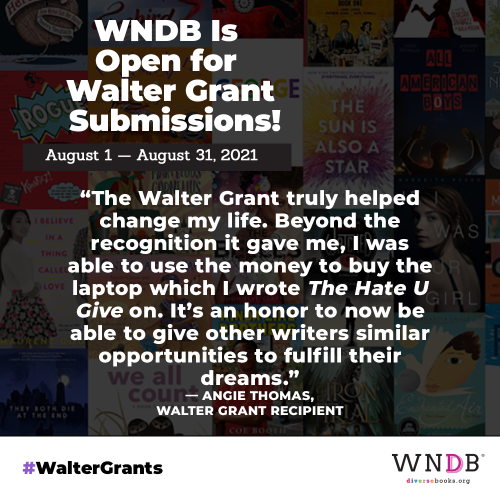
Walter Grants are open for submissions now through August 31, 2021! We will award 8 grants of $2000 to unpublished diverse writers & illustrators, including 3 brand new grants, thanks to donors Angie Thomas, A.M. Dassu, Margaret Owen, & Hanna Alkaf.
[Image description: Graphic featuring the WNDB logo, the program application dates (August 1 to August 31, 2021), header text that reads, “WNDB is Open for Walter Grant Submissions!”, and quote text that reads, “The Walter Grant truly helped change my life. Beyond the recognition it gave me, I was able to use the money to buy the laptop which I wrote THE HATE U GIVE on. It’s an honor to now be able to give other writers similar opportunities to fulfill their dreams.” — Angie Thomas, Walter Grant recipient]


